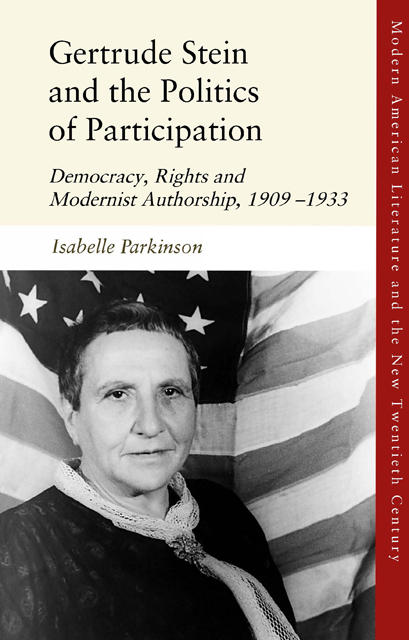 Gertrude Stein and the Politics of Participation
Gertrude Stein and the Politics of Participation Book contents
- Frontmatter
- Contents
- Acknowledgements
- Introduction: Gertrude Stein, Modernism, and Democracy
- Chapter 1 The Politics of Authorship in Three Lives
- Chapter 2 Authorship and Community in Stein’s Pre-war Portraits and Tender Buttons
- Chapter 3 Modernism’s Abject: Geography and Plays and Stein’s Contested Authorship
- Chapter 4 Useful Knowledge and the Mind of Mass Democracy
- Coda: Stein’s Democratic Authorship in The Autobiography of Alice B. Toklas
- Bibliography
- Index
Chapter 3 - Modernism’s Abject: Geography and Plays and Stein’s Contested Authorship
Published online by Cambridge University Press: 25 April 2023
- Frontmatter
- Contents
- Acknowledgements
- Introduction: Gertrude Stein, Modernism, and Democracy
- Chapter 1 The Politics of Authorship in Three Lives
- Chapter 2 Authorship and Community in Stein’s Pre-war Portraits and Tender Buttons
- Chapter 3 Modernism’s Abject: Geography and Plays and Stein’s Contested Authorship
- Chapter 4 Useful Knowledge and the Mind of Mass Democracy
- Coda: Stein’s Democratic Authorship in The Autobiography of Alice B. Toklas
- Bibliography
- Index
Summary
‘Two Cubist Poems. The Peace Conference’
In 1920, Oxford University's student paper, the Oxford Magazine, printed Stein's oblique comment on the Paris Peace Conference of 1919–1920, ‘Two Cubist Poems. The Peace Conference’. The reference to cubism in the title, whether supplied by Stein or added by the editor, relies on the visibility she had achieved in her association with a community of radical continental European artists. By 1920, however, this was beginning to give way to a period in which her practice was more commonly situated in relation to Anglo-American literary experimentation. Indeed, the fact of this publication by the student magazine of a leading British university reflects a developing interest in her authorship in Britain that included a short lecture tour to read and discuss her work at Oxford and at Cambridge in the summer of 1926. ‘Two Cubist Poems. The Peace Conference’ also reflects Stein's political stance, being one of a series of critical reflections on Woodrow Wilson's presidency that bespeak her now obdurate opposition to progressivism and to Wilson's perceived internationalism. This publication is also significant because it anticipates her resistance to the type of authority that she begins to attribute to some of the more prominent writers observing with suspicion her role on the scene of literary modern-ism through the 1920s.
For Stein, the League represents a top-down bureaucracy that extends the management logic of progressive democracy to manufacture a new world order, and what she objects to more and more vocally through this period is the gatekeeping role of expert authority that she often characterises as ‘academic’ thinking. In the series of works dealing explicitly with the political scene written in and around 1920, this resistance is coupled with an increasing emphasis on a racialised form of national belonging that she sets against a scene of nation-states ordered by a perceived supra-national global elite who calibrate the criteria through which citizens are legitimised. These works reflect Stein's rejection of the America represented by Wilson and the progressives and her interest in what might be described as a more ‘organic’ America of mass information, production and consumption, unregulated circulation, and the movement of crowds.
While Stein apparently embraced the expanded readership, the proliferation of publications and the possibilities for mass participation emerging since the turn of the century, other modernist writers took a different view.
- Type
- Chapter
- Information
- Gertrude Stein and the Politics of ParticipationDemocracy, Rights and Modernist Authorship, 1909-1933, pp. 140 - 188Publisher: Edinburgh University PressPrint publication year: 2023


